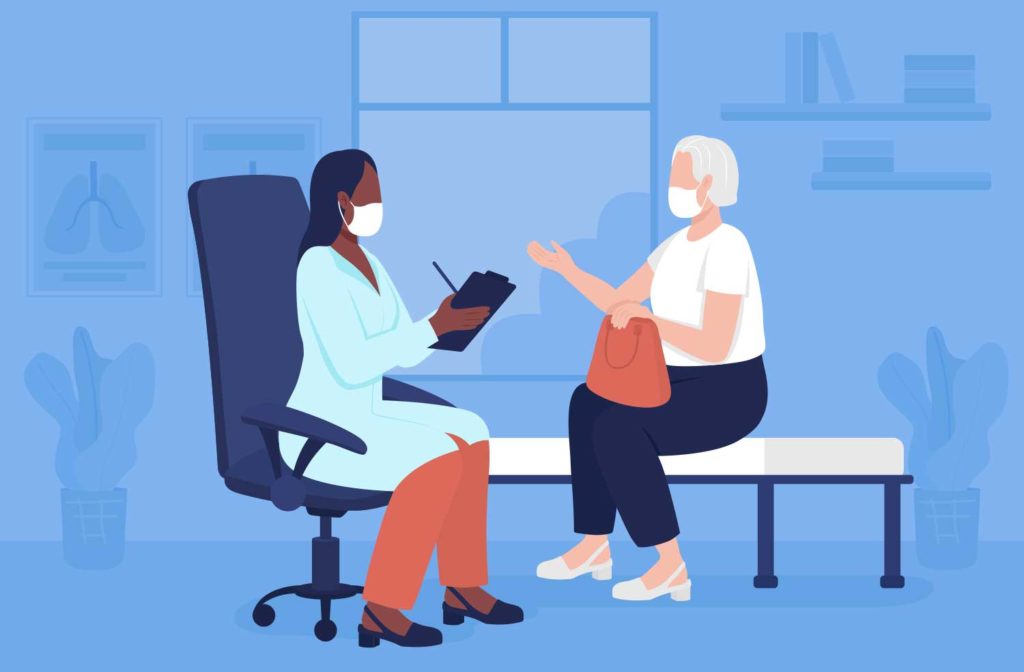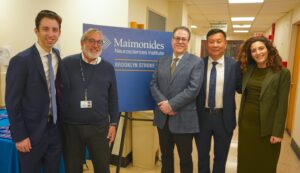Summary
Are you or a loved one ready to see a geriatrician? Dr. Barbara Paris discusses the complex medical and psychosocial needs of our seniors, and how geriatricians are uniquely equipped to deal with them.
Listen on Spotify Listen on Apple Podcasts Listen on Google Podcasts
Transcript
APrakash Chandran (Host): A Geriatrician is a doctor who is trained to treat older adults. Especially for those 65 and older, these doctors can navigate the specialized care needed for complex conditions or for patients who perhaps suffer from more than one condition. Joining us to discuss is Dr. Barbara Paris, the Director of Geriatrics and Vice-Chair of the Department of Medicine at Maimonides Medical Center.
This is Maimo Med Talk. I’m your host Prakash Chandran. So, Dr. Paris, thank you so much for joining us today. I wanted to start by asking when exactly is it appropriate for an individual to seek the care of a Geriatrician for themselves or a loved one?
Barbara Paris, MD (Guest): Thank you so much for having me on your show today. I think that’s a question that is partially answered by you, but in reality, most of our people str age 75 and older, because those are the patients who have progressive chronic diseases, are seeing multiple specialists and taking multiple medications. And the specialists are typically not talking to each other and the patient is declining in their physical and psychological function. So, we really take a holistic approach to the patient, look at all their medical problems, their psychosocial problems, and try to put it all together, as well as all their medications and really create a scenario for the patient where they can function at their best level of independence.
And if they’re at a point where we’re catching them, where we’re already past that point, we’re going to discuss with them what are their goals of care? What do they like to do in this last chapter of their life? And make sure that that time is spent as best possible for them with the least amount of discomfort and surrounded by whatever their wishes are.
Host: Okay, that makes a lot of sense. So, you know, you mentioned a couple of things, especially, maybe someone’s 75 and older, that has potential chronic diseases, multiple medications. If someone is 75 and older and does not have some of those things, is it still worthwhile to see a Geriatrician?
Dr. Paris: ‘It’s not absolutely necessary, but we do focus on issues that many older people are interested in focusing on that typically, the internist, we are internists or family medicine physicians who have also completed a fellowship another year of training in specifically geriatric medicine.
So, what happens to me typically is my doctor never really went over all the immunizations that I need at my age. My doctor did not discuss with me getting a health care proxy. My doctor told me that leaking urine or forgetting things is normal at my age. So, we get a lot of that and we call some of those things geriatric syndromes, like falls, confusion and incontinence, dementia, depression, and general functional decline, geriatric syndromes that typically, the doctor, the internist focuses on their hypertension, their heart disease and specific illnesses, not really addressing these kinds of syndromes that affect their quality of life and their function and their independence.
So we do our, as I said, are internists and do address all the medical problems like diabetes, hypertension, plus the geriatric syndromes. And we work as a team more often than, an internist will. Typically, we may have a social worker to assist us with some of these issues also, and to support the family, especially if they’re dealing with dementia, which is very difficult on the patient, as well as the family. And generally requires lots of education and counseling.
Host: Yes. Understood. I guess another question I wanted to ask is does a Geriatrician actually replace a primary care physician?
Dr. Paris: Yes. We do replace primary care physicians. We are primary care physicians for older individuals. There are a small cadre of patients that want to keep their primary care physicians and that’s absolutely fine with us. And then we act on a consultation basis to the primary care physician for the specific issues that are what we just described as geriatric syndrome.
So, somebody may see their primary doctor that they’ve had a relationship for years just for their general health, but they’ll see me once or twice a year for management of their dementia or their sleep disorder or their osteoporosis or their depression or other things, or their falls. So we can work with a primary care physician. We would want to define our roles and not have duplicate services.
Host: Yeah, that totally makes sense. So, maybe you can talk a little bit about what’s different about a patient’s relationship with a Geriatrician versus a primary care physician.
Dr. Paris: Well, we are primary care physicians, but we can be a team taking care of the patient, which will include the social worker and potentially if there’s a nurse in the practice, because we take a more holistic approach where we address not only the medical problems, but all the psychosocial and social issues that affect a person.
So, for example, we have what we call elder orphans. So, those are patients that have no family and nobody else in their life. So, we’re going to look at that patient and we’re going to say, we need to discuss your future care or your future goals. We need to know what you would want. What your wishes are, and we need to help you and guide you in setting up your finances, even your will, et cetera.
So, we’re going to look at a more broad picture of that patient’s whole life then typically an internist will do. And I also said that we are pretty careful about making sure everyone has some sort of advanced directive, which would tell the healthcare system what he or she would want in the event that they can no longer speak for themselves. And that’s for patients who have families too, because families are often in conflict with the patient or themselves about how to manage a crisis situation when the patient can’t speak for them, him or herself.
Host: Yeah, that’s completely understandable. Older patients or older adults do get sick. And so having a Geriatrician that takes that holistic approach is so very important. I wanted to circle back to something that you touched on earlier, and that’s the fact that you work with these specialists. Could you kind of detail out how that dynamic works?
Dr. Paris: So, older people need specialists as do younger patients. We didn’t do a fellowship in cancer. We didn’t do a fellowship in advanced heart disease, et cetera. So, we’ll reach out to the patient’s specialists, or we will send patients to a specialists as becomes necessary in the course of their illness. What is key is the coordination of care because these older patients have multiple coexisting chronic diseases at the same time. And their presentation of any illness can be complicated by the multiple pills that they take or the different diseases interacting. And it becomes a very big challenge to figure out what’s going on in many cases.
In many cases it’s just conflicting medications. So, a part of what we do, that’s very time-consuming, but it’s very key to a Geriatrician’s role is coordination of care with all of these other specialists, including a dentist, including a podiatrist, including your ophthalmologist, because even the eye drops can cause different medical problems in your body.
So, it’s very important that we know everybody involved in the care of a patient and that we talk to them and that we know the tests that they’ve done and that we know what medications they’ve given, so that we can see the big picture and the interaction. For example, a patient goes to the emergency room because they broke their arm and the emergency room takes care of them and gives them a painkiller, because there’s a fracture and it hurts. I don’t know anything about that because there’s no communication with that, the emergency room. And two days later, a patient’s son or daughter calls me up and says, my mom’s confused. I don’t know what’s wrong with her. Well, I have to backtrack and get the whole story. Oh, she’s on a medicine for pain now.
She broke her arm two days ago. Oh, well that might be causing the confusion. Let’s see if we could switch the medicine. So, rather than plug another hole with another medicine for confusion, you have to get to the whole picture and the underlying disease to understand what’s going on with that patient.
Host: You know, something that I’m realizing as we’re talking is that traditionally family members have had to saddle coordination and making sure all of the medications are correct for their family member or loved one. And so I imagine that the pairing of a Geriatrician along with family member that is managing everything is actually very good. Wouldn’t you say?
Dr. Paris: Yes, I always say to the residents that I train, the most helpful person is the annoying daughter, because she’s going to be on top of everything and will help you get all the information you need to understand what’s going on with your patient. Yes, we rely heavily on the families too. You know, they assume you have this information or I, oh, I told my cardiologist to send you the echocardiogram. Well, telling your cardiologists to do it and that actually coming to my office is two separate things.
So, there’s a lot of reasonable assumptions, I would say on the part of patients and family members that doctors do talk to each other, that reports do get to each other that even within your own healthcare system, you’re going to find out that mom was hospitalized, but there are different, electronic records even within one healthcare system. So, these assumptions, unfortunately, I wish they were correct, but they’re incorrect. And we are blinded to a lot of key information when we’re trying to take care of patients.
Host: Yeah, now obviously mental health and wellbeing is still very important, even in your later years. What is the role of a Geriatrician in dealing with those issues?
Dr. Paris: We have a very important role in dealing with mental health and wellbeing of our patients. And we have been trained in our fellowship to take care of depression, dementia, and behavioral issues related to dementia and sleep issues, and anxiety disorders and post-traumatic stress disorder. We have been trained to take care of those problems, which, you know, the mind and the body are connected.
They’re not separate. And we do a lot related to those issues for our patients. And it is often us who make the diagnosis of depression or dementia or anxiety disorder or post-traumatic stress disorder and take care of the patient and give the patient the necessary psychosocial support, whatever that might be for that patient, as well as appropriate medications and monitor them.
There are occasions where we will refer to a neurologist or a psychiatrist, but for the majority of the patients, we’re capable of managing those problems ourselves. One thing that’s very important to us is that we have relationships with us for 10, 20 to 30 years. If someone’s coming to us at age 70, many of our patients live well into their nineties and over 100.
So we have very long-term relationships with our patients and their families. And it’s very important to us that when they get to the end of their life or that chapter in their life, that we’re there for them. And that we understand their goals of care, understand what’s important to them and really are there to make sure that they get the kind of care that’s appropriate and aligned with their wishes.
Host: I can’t help but think about my grandmother, and she’s 92, as we talk about all of the things a Geriatrician does today. Is it ever too late to see a Geriatrician and to get one involved? Because at least the way that I think about it is, you know, 92, there might not be a whole lot of years left, but maybe that’s something that you can address.
Dr. Paris: Absolutely not too late. And I must say that there are days that we see nobody under 90 in the office and it’s a perfect time. I’m glad she got to be 92 without needing a Geriatrician, but it’s a perfect time.
Host: Okay.
Dr. Paris: It’s never too late.
Host: Yeah, that’s really wonderful to hear. So, just before we close here today, is there anything else that you’d like to share with our audience about geriatric medicine or just any of the topics that we’ve touched on today?
Dr. Paris: I just really want to say that it’s an extremely gratifying field of medicine. Some people think, wow, why do you want to take care of old people? Well, they’re wonderfully rich in their lives. Have great stories to tell, and they’re very grateful for any kind of improvement in the quality of their lives. Attention that they get and little changes go a long way in making the quality of their life better. Once you understand that our goal is we’re not going to make you younger, we’re not going to cure your chronic diseases. Yes, we can cure an intercurrent acute illness, but basically we’re just trying to make this chapter in your life the best it can be for you to have the best function, the most independence and whatever your goals are in life to be met. And Geriatricians are very happy doctors. We love our patients and we’re very satisfied with our work.
Host: Well, Dr. Paris, I think that is the perfect place to end. Thank you so much for your time today.
Dr. Paris: You’re welcome. My pleasure.
Host: That was Dr. Barbara Paris, the Director of Geriatrics and Vice Chair of the Department of Medicine at Maimonides Medical Center. To learn more about this topic, please visit maimo.org. That is spelled M-A-I-M-O.org. Or call 718-283-7071 to make an appointment. This has been Maimo Med Talk. My name is Prakash Chandran. Thank you so much. And we’ll talk next time.







